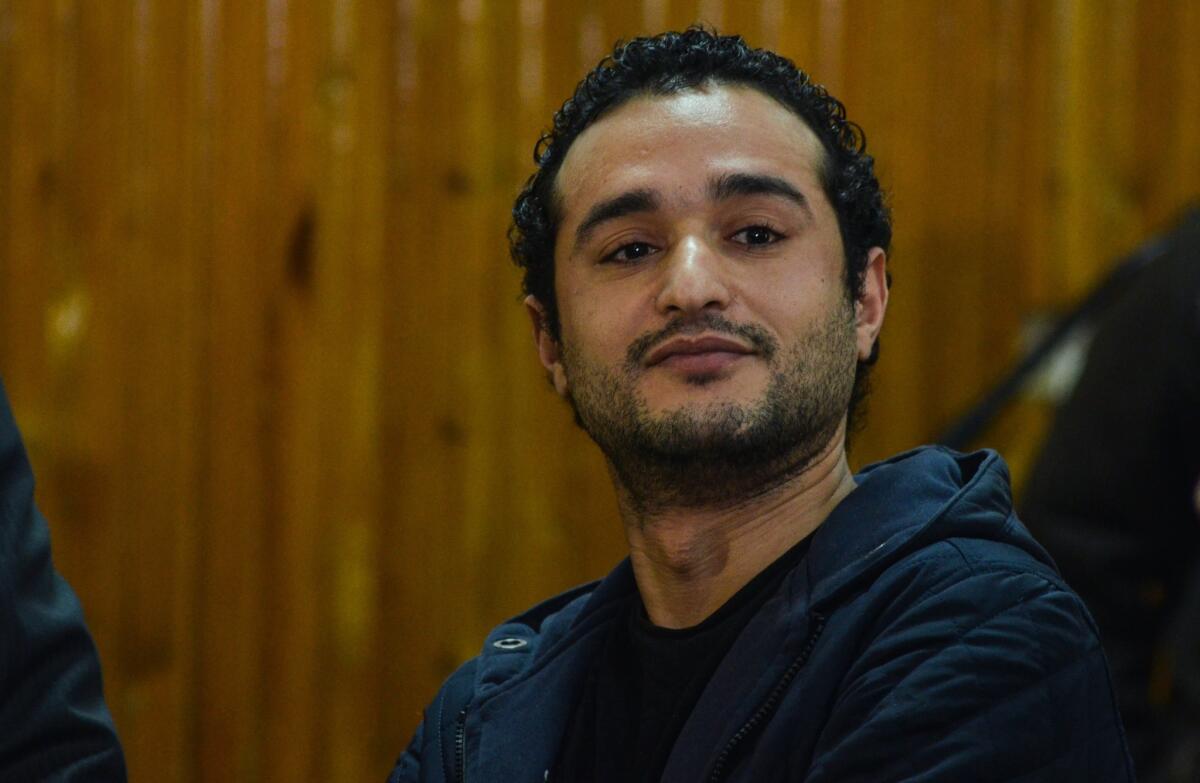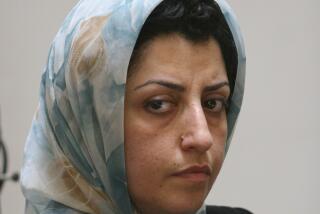Egyptian court sentences 230 people en masse to life in prison

- Share via
Reporting from Cairo — In the second harsh verdict this week to arise from a mass tribunal, a Cairo court Wednesday sentenced a prominent rights activist and 229 others to life in prison.
The sentences, which can be appealed, are by far the longest jail terms handed down to non-Islamist opponents of the government. The case also points to what amounts to a systematic crushing of mainly secular figures who played key roles in Egypt’s 2011 revolution that toppled longtime dictator Hosni Mubarak.
A parallel crackdown on Islamist supporters of ousted President Mohamed Morsi has left hundreds of people dead and tens of thousands imprisoned.
The best-known of the defendants in Wednesday’s case was Ahmed Douma, who was one of the leaders of the revolt that became a centerpiece of the regional Arab Spring uprisings four years ago. He was arrested in connection with what witnesses and the defendants described as a peaceful protest against the military council that had replaced Mubarak, but authorities accused the defendants of various acts of violence after police moved in to break up the demonstration.
In Wednesday’s case, nearly 40 minors were also sentenced in absentia to 10 years in prison. Douma was ordered to pay a fine of more than $2 million.
Human rights groups and Western governments have denounced mass tribunals as a disgraceful miscarriage of justice. Defense lawyers say there is no way they can adequately plead their clients’ case when dozens or even hundreds of people are put on trial at once.
The judge in Wednesday’s proceedings, Nagy Shehata, had days earlier presided over the sentencing of 183 people to death in connection with a deadly attack on a police post in 2013. Shehata was also the judge who last year sentenced three journalists for the news channel Al Jazeera English to prison terms of up to 10 years.
One of the three, Australian correspondent Peter Greste, was freed and deported Sunday, but his colleagues remain imprisoned. One, a dual Egyptian-Canadian national, has renounced his Egyptian citizenship in hopes of being deported as Greste was, but the other, an Egyptian holding no other passport, will likely have no such recourse.
Greste, who was greeted Wednesday at the airport in his home city of Brisbane by supporters, relatives and journalists, said he was “ecstatic” to be free after 400 days in Egyptian prison, but that his joy was tempered by worries for his two jailed colleagues and others convicted in absentia in the case.
“If it’s right for me to be free, it’s right for all of us,” he said.
At Wednesday’s court session in Cairo, Douma responded sardonically to the reading-out of the verdict. From the caged defendants’ dock that is commonly used in Egyptian criminal proceedings, he laughed and mock-applauded the judge, the Reuters news agency reported.
Egypt has come under strong international criticism for the extreme disarray in its once-respected judiciary system, with many critics of the government undergoing what their supporters describe as sham trials. Last month, Human Rights Watch described the overall rights climate in the country as being at a post-revolution “nadir.”
Under President Abdel Fattah Sisi, Egypt has sharply curtailed rights of free speech and assembly. An estimated 40,000 people have been imprisoned for dissent, human rights groups have estimated.
With street protests in effect outlawed, police routinely use live ammunition -- usually bird shot -- to break up gatherings. Rights groups have accused the government of covering up the police role in the death last month of 31-year-old poet and activist Shaimaa Sabbagh.
Sabbagh was fatally shot as she and a group of others were on their way to lay flowers in Tahrir Square, epicenter of the 2011 uprising and the scene of many protests since then. Her dying moments were captured on video and in photographs, and have become a rallying point for official accountability in the use of deadly force against peaceful demonstrators and jailhouse torture of those who criticize the regime.
Follow @laurakingLAT on Twitter for news out of Egypt
More to Read
Sign up for Essential California
The most important California stories and recommendations in your inbox every morning.
You may occasionally receive promotional content from the Los Angeles Times.













